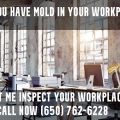Mold in the Workplace and how to get a Mold Inspection

Employees' health is at risk if mold of any kind is found in the workplace. It should be eliminated as soon as feasible. Mold exposure has been linked to the following health problems, according to NIOSH:
- Allergies: Asthma is characterized by sneezing, nasal congestion, a runny nose, and red, itchy, or watery eyes. Mold can cause asthma-related symptoms, including shortness of breath, wheezing, or coughing in workers who already have allergies.
- Hypersensitivity pneumonitis: When a person's immune system becomes sensitized to inhaled organic dust, a condition known as hypersensitivity pneumonitis (HP) can develop in the lungs. However, antibiotics are ineffective in the treatment of this condition. The continuous inflammation in the lungs might lead to long-term harm if it is not treated.
- Asthma: Lung inflammation occurs in asthma because of exposure to allergens or other irritants that irritate or sensitize the airways. Symptoms of asthma include shortness of breath, wheezing, coughing, tightness in the chest, and other respiratory problems.
NIOSH recommends that employees who are concerned about mold exposure at work is hurting their health seek emergency medical attention, report their concerns to their supervisors, and consult with their doctors to determine whether they should be medically restricted from their employment.
NIOSH claims that excessive moisture is the most common cause of mold formation in the indoor environment. The following steps should be taken by supervisors who have reason to believe mold is causing health issues in their workforce:
Keep an eye out for signs of wetness in your home.
HVAC systems can help keep your home's air dry.
If an employee is concerned about their health, always reply.
Set up a system for recording and reacting to complaints about indoor air quality.
Create a plan of action and implement it.
Ensure that corrective action has been taken and that it has been successful.
Recommend that employees who are experiencing worsening or chronic respiratory issues seek medical attention.
Health care providers should be followed in relocating personnel who have been diagnosed with building-related respiratory disease.
Mold at the workplace should be reported.
It's important to notify the proper authority whenever you find mold in the workplace, or if you see any symptoms of mold exposure. Mold should be reported in the workplace in the following ways:
- When you first notice mold growing in your workspace, the first thing you should do is notify your management. Make use of a channel of communication that lets you maintain track of what's going on. It's fine to use email.
- Be sure to convey complete and correct facts when speaking with others. Tell when you first became aware of the presence of mold in the workplace. Accurately document where you initially observed a problem, as well as how large it was.
- You must provide specific information on the environment, such as indicators of water damage or moisture availability. Condensed liquids on surfaces, leaking pipes, and structural damage on ceilings are all signs of something wrong. Make sure to look for black stains or musty odors coming from air conditioners or vents as well.
- Please make sure your employer or supervisor is aware of any recent moisture or water exposure instances. Flooding, wet furniture, or a leaking roof is all examples of this.
- If you don't hear back from the appropriate authority within a reasonable amount of time after sending an email, your next step should be to go in person. Your email previously informed them of the mold problem, so tell them about it. If they cannot present you with a practical answer, speak with a more senior member of the company's staff.
- After exhausting all of its available options to solve the mold problem, it's time to look for a solution outside of the firm.
It doesn't matter where you end up in the process; the most important thing is that your company repairs the problem area and addresses the root cause. They have to fix the leaks, fix the pipes, improve the ventilation, and put up new siding, windows, or roofs, among other things.
Don't forget to get a medical exam after being exposed to mold. This way, you'll be able to keep track of your health and see if any issues need to be addressed.
What happens during a mold inspection?
For the most part, mold inspection is a visual examination of a residence. There's no need for any extra equipment other than a flashlight and a few basic tools for getting into restricted regions (like removing grates to inspect HVAC ducts). Mold inspectors sometimes use cameras. Even after restoration, a moisture meter can help determine whether or not an area is damp.
As part of a mold examination, the inspector will speak with the property owner about any locations where they have observed mold or where there has been a water damage or moisture problem in the past. The inspector will conduct a comprehensive inspection of the property, looking for signs of mold growth. The inspector may have to destroy a bit of drywall or remove paneling to obtain a better look if mold is suspected of developing in an inaccessible area. Any time the inspector discovers mold growth, they work with the homeowner to devise a mold removal strategy.
Mold inspectors in some cities are required to hold a license or certification. Always hire a mold repair and mold inspection contractor with extensive experience.
A mold examination is unnecessary if you can see it, you can begin the remediation process immediately. You don't need to spend money on a professional inspector to find out what you know already. However, as part of the cleanup procedure, the contractor will typically do an in-depth mold examination to determine the degree of the problem.
What affects the cost of a mold inspection?
The size of the house being investigated and whether or not the inspector has to remove or destroy components of the property, such as drywall or paneling, to finish the inspection are the two key elements that influence the cost of a mold inspection.
Simply said, an inspection of a large house or workplace will be more expensive due to the additional time and resources required. The additional time and effort required to conduct an "invasive" inspection, such as digging under drywall or sifting through a crawlspace, adds to the expense.
Related items:
 5/21/2021
Mold Testing and Mold Inspection for residential and commercial properties in San Francisco
5/21/2021
Mold Testing and Mold Inspection for residential and commercial properties in San Francisco